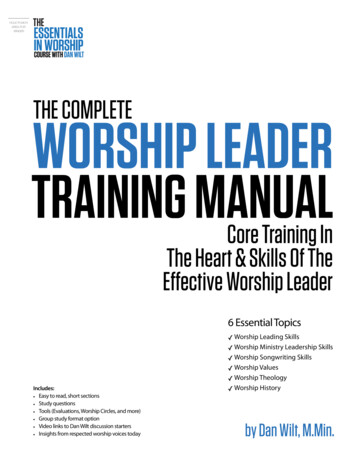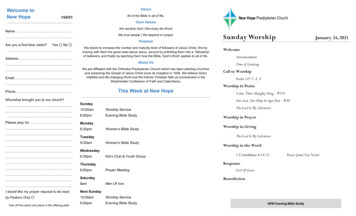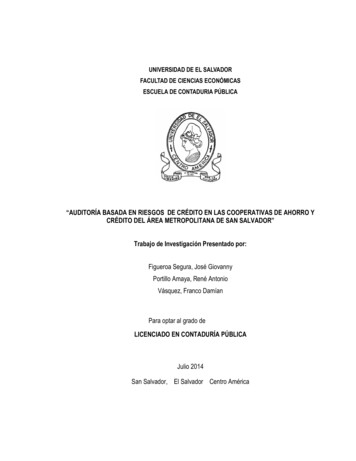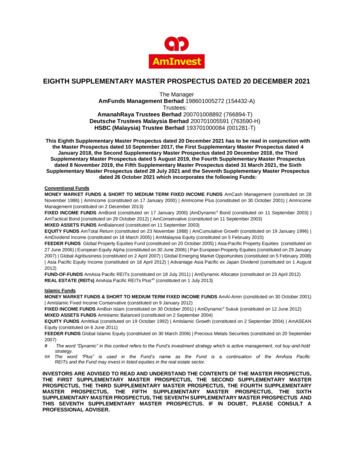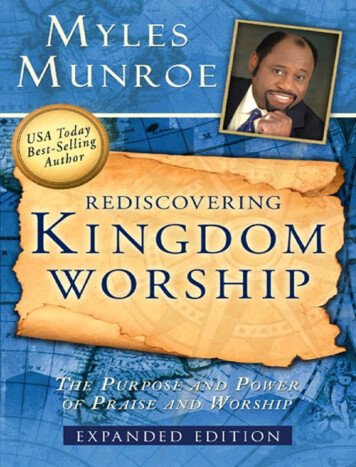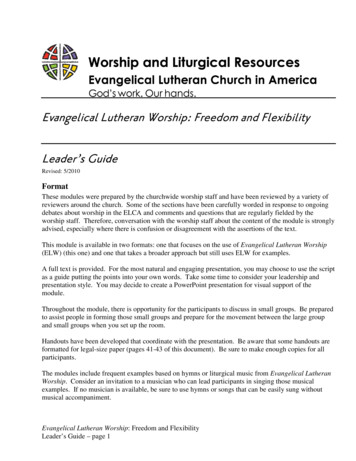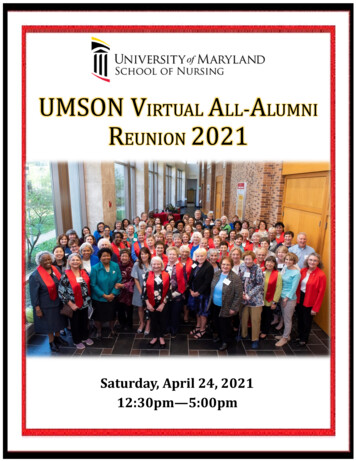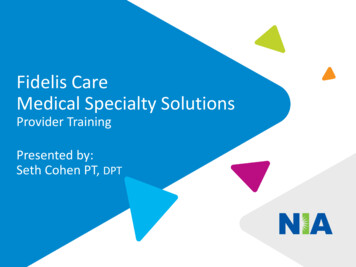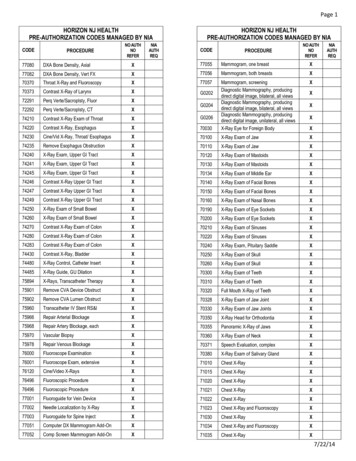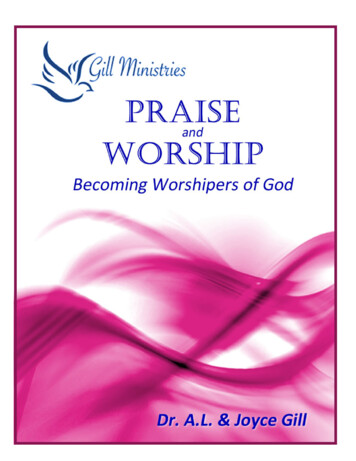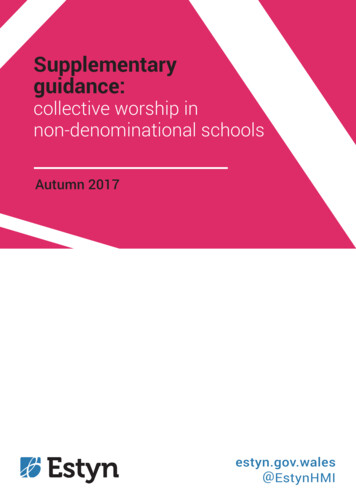
Transcription
Supplementaryguidance:collective worship innon-denominational schoolsAutumn 2017estyn.gov.wales@EstynHMI
The purpose of Estyn is to inspect quality and standards in education andtraining in Wales. Estyn is responsible for inspecting: nursery schools and settings that are maintained by, or receive funding from,local authorities primary schools secondary schools all-age schools special schools pupil referral units independent schools further education independent specialist colleges adult community learning local authority education services for children and young people teacher education and training Welsh for adults work-based learning learning in the justice sectorEstyn also: provides advice on quality and standards in education and training in Wales tothe National Assembly for Wales and others makes public good practice based on inspection evidenceEvery possible care has been taken to ensure that the information in this document isaccurate at the time of going to press. Any enquiries or comments regarding thisdocument/publication should be addressed to:Publication SectionEstynAnchor CourtKeen RoadCardiffCF24 5JW or by email to publications@estyn.gov.walesThis and other Estyn publications are available on our website: www.estyn.gov.walesThis document has been translated by Trosol (English to Welsh). Crown Copyright 2017: This report may be re-used free of charge in anyformat or medium provided that it is re-used accurately and not used in amisleading context. The material must be acknowledged as Crown copyrightand the title of the document/publication specified.
What is the purpose of this supplementary guidance?To provide updated guidance for inspectors on evaluating collective worship.For whom is it intended?Inspectors of maintained and independent schools.From when should it be used?September 2017.ContentsPageSupplementary guidance1What are the legal requirements for collective worship?2What is collective worship?3How do we inspect and report on collective worship?4Frequently asked questions5
Supplementary guidance: collective worship in non-denominational schoolsSeptember 2017Supplementary guidanceThe key Estyn documents that guide inspection activity are the inspection guidancehandbooks for each sector. However, we also produce supplementary guidance tohelp inspectors to consider specific aspects of education and training further.The supplementary guidance documents set out some key principles, considerationsand resources for inspectors. They relate to all sectors that Estyn inspects, unlessthey state that they are for a specific sector. They expand on certain aspects ofeducation/training (e.g. the inspection of literacy) or on ways of conductinginspections (e.g. the use of learning walks) or specific inspection arrangements (e.g.guidance on inspecting church schools).The supplementary guidance documents do not aim to be comprehensive.Inspectors are not required to work through them exhaustively when covering anyspecific aspect on an inspection. However, inspectors may find them useful whenresponding to specific emerging questions that arise during inspections or when theywish to reflect or investigate further.The supplementary guidance documents may help providers gain an understandingof Estyn’s inspection arrangements. They may also be helpful to providers inevaluating specific aspects of their own provision.Our inspection work is based on the following principles: Inspectors will approach inspection with a positive mindset to ensure it is thebest possible professional learning experience for the staff in each providerInspectors will take a learner-focused approach to inspectionInspectors will always focus strongly on the quality of teaching and learningInspectors will seek out well-considered innovative practiceInspectors will tailor the inspection activities according to the circumstances ineach provider as far as possibleInspectors will be agile and responsive to emerging findings and will use theincreased range of inspection tools and approaches availableInspectors will consider everything in the inspection framework, but will onlyreport on the key strengths and weaknesses within each provider1
Supplementary guidance: collective worship in non-denominational schoolsSeptember 2017What are the legal requirements for collective worship?The Education Reform Act 1988 and the Welsh Office Circular 10/94 set out the legalrequirements for collective worship in schools in Wales. These requirements apply topupils in maintained schools other than special schools. The requirements do notapply to colleges of further education or to nursery schools or nursery classes ininfant or primary schools.The Education (Special Schools) Regulations 1994 set out the requirements forcollective worship in special schools.The Education (Special Educational Needs) (Approval of Independent Schools)Regulations 1994 set out the requirements for collective worship in independent(usually special) schools for pupils who have been placed there by a local educationauthority.The requirements are: schools must provide collective worship daily for all registered pupils most acts of collective worship in each term should be wholly or mainly of abroadly Christian character; this means that they should reflect the broadtraditions of Christian belief without being distinctive of any particular Christiandenomination collective worship can take place at any time during the school day collective worship can be provided to pupils in any sized group, for example, as aclass, a year group, a phase group or a whole-school community collective worship should take account of the family backgrounds, ages andaptitudes of the pupils involvedThere is no legal requirement to provide collective worship for pupils aged under five.A parent can request that their child is excused from collective worship and schoolsmust agree to such requests. Parents do not have to give reasons. Pupils who areexcused must be supervised by the school. The school may, in agreement withparents, provide alternative arrangements for worship for one or more pupils that areexcused, but is not obliged to do so. The school prospectus should refer to parents’right to request that their child is excused from collective worship and outline thearrangements for pupils who are excused.The Education and Inspections Bill 2006 gives pupils in sixth forms the right toexcuse themselves from collective worship. This legislation was brought into force inWales in February 2009.Teachers have the right to withdraw from collective worship. However, the schoolmust ensure that collective worship is still provided daily for all pupils.2
Supplementary guidance: collective worship in non-denominational schoolsSeptember 2017What is collective worship?Worship is not defined in legislation. The guidance to schools in Welsh OfficeCircular 10/94 includes the following definition:It must in some sense reflect something special or separate fromordinary school activities and it should be concerned with reverenceor veneration paid to a divine being or power.Worship in schools will be different from worship amongst a group of people withbeliefs in common. This is acknowledged in legislation through the reference to‘collective’ worship rather than ‘corporate’ worship.The aim of collective worship in schools is described in Welsh Office Circular 10/94:Collective worship in schools should aim to provide the opportunityfor pupils to worship God, to consider the spiritual and moral issuesand to explore their own beliefs; to encourage participation andresponse, whether through active involvement in the presentation ofworship or through listening to, watching and joining in the worshipoffered; and to develop community spirit, promote a common ethosand shared values, and reinforce positive attitudes.An act of collective worship is distinct from an assembly. Although they often takeplace during the same gathering, the difference between the two should be clear.Collective worship in schools can take a number of forms. Pupils may take some orall of the lead. Some of the appropriate components of collective worship areoutlined in the box below, but this should not be regarded as an exhaustive list.An act of collective worship may incorporate one or more of these components. Reflection – pupils may be encouraged to listen to, watch or reflect on anappropriate stimulus, such as a reading from the Bible or other religious writing,a drama sketch, a dance, a video, a song, a piece of music, an artefact, a poem,a story, a news article, a photograph, a picture, a prayer, a question, a ritual or apresentation or a talk from a member of staff or visiting speaker. Prayer – pupils may be encouraged to say a prayer aloud together or to prayindividually in silence. Song – pupils may be encouraged to sing a hymn or other worship songtogether. Reading – pupils may be encouraged to read an extract from the Bible or otherreligious writing, or a ‘thought for the day’.Pupils may discuss a stimulus during collective worship, but discussion on its ownmust not be considered as worship. Equally, collective worship does not have toinclude the opportunity for discussion.3
Supplementary guidance: collective worship in non-denominational schoolsSeptember 2017How do we inspect and report on collective worship?Inspectors should inspect acts of collective worship in all schools that do not providedenominational education. They should consider acts of collective worship in theirown right and in the context of planning over a period of time. In relation to statutoryrequirements for collective worship, they should only report on instances where theschool does not comply with these.In judging the inspection area 4 (‘Care, support and guidance’), inspectors willconsider the quality of collective worship and whether a school meets the relevantlegal requirements. Inspectors should consider the spirit of the law when inspectingcollective worship as well as the letter of the law. Minor or occasional breachesshould not lead to an overall judgement that a school does not comply with the legalrequirements.Although collective worship in a school may not comply with legal requirements, itmay still make a significant contribution to pupils’ spiritual, moral, social and culturaldevelopment. Conversely, collective worship may satisfy legal requirements yetmake a limited contribution to pupils’ spiritual, moral, social and cultural development.It is not sufficient for pupils to simply be present during collective worship. Inspectorsmust ensure that the person leading the worship at least prepares pupilsappropriately and encourages them to listen to, watch or reflect on the worshipoffered. It can be difficult to judge whether or not pupils are listening to, watching orreflecting on worship and so inspectors may need to satisfy themselves that areasonable attempt was made by the school to provide the opportunity for collectiveworship.Inspectors: should not take notes during collective worship should not time the length of collective worship – no minimum length is set inlegislation or guidance should not allow their personal views on collective worship or religion to affecttheir judgements are observers during collective worship and should not feel obliged to take part4
Supplementary guidance: collective worship in non-denominational schoolsSeptember 2017Frequently asked questions1Should pupils bow their heads and close their eyes during prayer?It is their personal choice whether or not to bow their heads and close their eyesduring prayer. If pupils choose not to, inspectors should not assume that they arebeing irreverent or disrespectful and nor should they conclude that the act ofcollective worship fails to meet the legal requirements because of this.2Should pupils say ‘amen’ at the end of a prayer?It is their personal choice whether or not to agree with the prayer and whether or notto say ‘amen’ aloud. If pupils choose not to, inspectors should not assume that theyare being irreverent or disrespectful and nor should they conclude that the act ofcollective worship fails to meet the legal requirements because of this.3Should pupils be made to sing hymns or worship songs?It is their personal choice whether or not to sing hymns or worship songs. The lawrequires schools to provide the opportunity for pupils to worship. The law does notrequire schools to make pupils worship.4A whole-school act of collective worship observed during an inspection didnot make any reference to the Christian faith – is this acceptable?The law states that most acts of collective worship in each term should be ‘wholly ormainly of a broadly Christian nature’. Therefore it is acceptable if occasionally an actof collective worship is not clearly linked to the Christian faith. Inspectors shouldcheck the school’s record of recent themes for collective worship to ascertainwhether or not the school complies with the law.5A primary school says it cannot provide collective worship on two days ofthe week as the only hall is not available. Is this acceptable?No, this is not acceptable as the pupils do not have to congregate in a hall forcollective worship. If the hall is not available on two days of the week then the schoolshould make arrangements for collective worship to be provided in smaller groups in6A teacher read a ‘thought for the day’ to a secondary school form group,supported by a presentation on screen, before dealing with administrativematters for the remainder of the form period. Does this meet therequirement for an act of collective worship?Consideration must be given to the content of the ‘thought for the day’ and the way inwhich the teacher leads it. If ‘thoughts for the day’ are primarily and usuallyphilosophical rather than wholly or mainly Christian then, however much this maysupport pupils’ moral development, it does not comply with the legal requirement foran act of collective worship. If the ‘thought for the day’ is mainly Christian then this isan acceptable approach. It would be good practice for the teacher to encouragepupils to reflect on the content and provide opportunity for this.5
Supplementary guidance: collective worship in non-denominational schoolsSeptember 20177An inspector is unsure whether the collective worship in a secondaryschool form group meets the legal requirements – what should thejudgement be?Unless an inspector is confident that the school is not providing pupils with theopportunity to worship then the judgement should be that the school meets the legalrequirements.8The teacher of a form group in a secondary school does not agree withcollective worship and does not give the pupils an opportunity to worshipwhen they are not in a year or whole-school assembly. Does this meanthat the school fails to meet the legal requirements?Although teachers have the right to withdraw from collective worship, the school muststill provide collective worship for pupils in this class. If the school does not usuallymake alternative arrangements for this class, then this would lead to a judgementthat the school fails to meet the legal requirements.9During a secondary school inspection, a supply teacher for a form groupdoes not provide pupils with an act of collective worship. Does this meanthat the school fails to meet the legal requirements?It may not always be possible for schools to provide a daily act of collective worshipdue to constraints on staff or for other reasons such as the availability of large rooms.Inspectors should therefore consider the provision over the year, not just on the dayof the observation. The lack of provision for collective worship on one day should noton its own lead to a judgement that the school fails to meet the legal requirements.10 Do schools have to provide collective worship for sixth-form pupils?Schools must provide daily acts of collective worship for sixth-form pupils, but pupilsmay request to be excused from them. Under the Education and Inspections Bill2006, sixth-form pupils have the right to excuse themselves from collective worshipand schools should ensure that pupils are aware of this. Schools must not assumethat sixth-form pupils wish to be excused from collective worship and therefore musthave an active request from pupils to opt out. There is no requirement for pupils toput their request in writing, but schools should keep an up-to-date record of requestsfrom pupils. Schools may usefully discuss this with pupils during their induction tothe sixth form.11 How can collective worship be ‘broadly Christian’ in a school that has ahigh proportion of Muslims?The school should take account of the fact that it has a high proportion of Muslims.Those leading collective worship should be sensitive to the range of beliefs held bypupils in the school. Collective worship should give pupils the opportunity to worshipwithout encouraging them to do something that is against the teachings of theirreligion. For example, times of prayer may be left open-ended for pupils to say theirown prayers silently.6
Supplementary guidance: collective worship in non-denominational schoolsSeptember 201712 A school complies with the legal requirements for collective worship. Doesthis need to be noted in the inspection report?No. Inspectors should only report on statutory requirements for collective worshipwhere the school does not comply with these. However, inspectors may wish toreport on the positive contribution that collective worship makes to pupils’ spiritualand moral development.13 Is an assembly an act of collective worship?The two terms are not interchangeable and mean different things. An assembly isoften used to reinforce values and expectations, share news, celebrate achievement,and receive presentations from visitors, for example. An act of collective worship is astatutory requirement and may form a distinctive part of an assembly. However, aschool could provide an act of collective worship separately from an assembly.When writing reports, inspectors should ensure that judgements refer appropriately tocollective worship, assemblies, or both. For example, any of the judgements belowcould be appropriate:(i) ‘acts of collective worship promote pupils’ spiritual and moral developmentsuccessfully’;(ii) ‘assemblies promote pupils’ spiritual and moral development successfully’;(iii) ‘assemblies, including acts of collective worship, promote pupils’ spiritual andmoral development successfully’; or(iv) ‘assemblies and acts of collective worship promote pupils’ spiritual and moraldevelopment successfully’.14A group of pupils are withdrawn from form period and assemblies, whencollective worship takes place, for specialist support (for example, literacyor numeracy interventions or counselling). Is this acceptable?No, this is not acceptable as there is no provision in law for the school to withdrawpupils from collective worship. The school should ensure that all pupils have theopportunity to participate in a daily act of collective worship.7
collective worship can take place at any time during the school day collective worship can be provided to pupils in any sized group, for example, as a class, a year group, a phase group or a whole-school community . a video, a song, a piece of music, an artefact, a poem, a story, a news article, a photograph, a picture, a prayer, a question .
